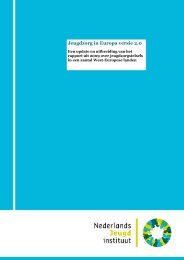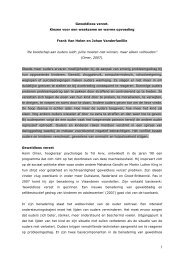ReferencesAlinsky, S.D. (1971). Rules for radicals: A pragmatic primer for realistic radicals. New York:Random House.Allen, G. (2011). Early intervention: Next steps. London: Cabinet Office.Aos, S., Lee, S., Drake, E., Pennucci, A., Klima, T., Miller, M., Anderson, L., Mayfield, J. &Burley, M. (2011). Return on investment: Evidence-based options to improve state-wideoutcomes (Document No. 11-07-1201). Olympia: Washington State Institute for PublicPolicy.Augimeri, L., Koegl, C.J., Slater. & Ferrante, P. (2007). Toward the establishment of a SNAPCommunity of Practice. Ontario: Centre for Children Committing Offenses (CCCO).Axford, N. (2012). Practitioner motivation and evidence-based programmes. Unpublished paper.Dartington: Social Research Unit.Axford, N., Lehtonen, M., Tobin, K., Kaoukji, D. & Berry, V. (2011). How to engage parents inparenting programmes: Lessons from research and practice. Report for Birmingham CityCouncil. Dartington: Social Research Unit.Bandura, A. (1977). Social learning theory. New York: General Learning Press.Bachrach, L. L. (1987). Leona Bachrach speaks – selected speeches and lectures. Michigan:Jossey-Bass.Barlow, J., Kirkpatrick, S., Stewart-Brown, S. & Hilton, D. (2005). Hard-to-reach orout-of-reach? Reasons why women refuse to take part in early interventions.Children & <strong>Society</strong>, 19(3), 199–210.Barnes, J., MacPherson, K. & Senior, R. (2006). Factors influencing the acceptance ofvolunteer home-visiting support offered to families with new babies. Child & FamilySocial Work, 11(2), 107–117.Bates, P. & Davis, F.A. (2010). Outside-in service design. International Journal of Leadership inPublic Service, 5(3), p.43–49.Bell, M. (2007). Community-based parenting programmes: an exploration of the interplaybetween environmental and organisational factors in a Webster-Stratton project.<strong>British</strong> Journal of Social Work, 37(1), 55–72.Boss, P. (2002). Family stress management (2nd edn). Thousand Oaks: Sage.Bradshaw, J., Hoelscher, P. & Richardson, D. (2007). An index of child well-being in theEuropean Union. Social Indicators Research, 80, 133–177.Broadhurst, K., Hall, C., Wastell, D., White, S. & Pithouse, A. (2010). Risk, instrumentalismand the humane project in social work: identifying the informal logics of riskmanagement in children’s statutory services. <strong>British</strong> Journal of Social Work, 40,1046–1064.74 Professional Practice Board
Broidy, L.M., Nagin, D.S., Tremblay, R.E., Bates, J.E., Brame, B., Dodge, K.A., Fergusson,D., Horwood, J.L., Loeber, R., Laird, R., Lynam, D.R., Moffitt, T.E., Pettit, G.S. &Vitaro, F. (2003). Developmental trajectories of childhood disruptive behaviors andadolescent delinquency: a six-site, cross-national study. Developmental Psychology, 39(2),222–45.Brondolo, E., Gallo, D.C., Meyers, H.F. (2009). Race, racism, and health: disparities,mechanisms, and interventions. Journal of Behavioural Medicine, 32, 1–8.Bronfenbrenner, U. (1979). The ecology of human development: Experiments by nature anddesign. Cambridge, MA: Harvard University Press.Bumbarger, B. & Perkins, D. (2008). After randomised trials: issues related to thedissemination of evidence-based interventions. Journal of Children’s Services,3 (2), 55–64.Cabinet Office. (2009). Social return on investment – and commissioning. London: CabinetOffice.Caspe, M. & Lopez , M.E. (2006). Lessons from family-strengthening interventions: Learning fromevidence based practice. Cambridge, MA: Harvard Family Research Project.Cicchetti, D., & Lynch, M. (1993). Toward an ecological/transactional model ofcommunity violence and child maltreatment: Consequences for children'sdevelopment. Psychiatry, 53, 96–118.Crnic, M. & Greenberg, M.T. (1990). Minor parenting stresses with young children. ChildDevelopment, 61(5), 1628–1637Coie, J.D. (1990). Toward a theory of peer rejection. In S.R. Asher & J.D. Coie (Eds.), Peerrejection in childhood (pp. 365–398). Cambridge: Cambridge University Press.Coleman, J. (1994). Foundations of social theory. New York: Belknap Press.Collishaw, S., Maughan, B., Goodman, R. & Pickles, A. (2004). Time trends in adolescentmental health. Journal of Child Psychology and Psychiatry, 45(8), 1350–1362.Coulter, S. (2007). The impact of engagement processes on the first-appointmentattendance rate at a regional out-patient psychological trauma service. Child Care inPractice, 13(2), 117–123.Coussée, F., Bradt, L., Roose, R. & Bouverne-De-Bie, M. (2010). The emerging socialpedagogical paradigm in UK child and youth care: deus ex machina or walking thebeaten path? <strong>British</strong> Journal of Social Work, 40, 789–805.Crosby, R.A. & Holtgrave, D.R. (2006). The protective value of social capital against teenpregnancy: a state-level analysis. Journal of Adolescent Health, 38(5), 556–559.Cunningham, C., Boyle, M., Offord, D., Racine, Y., Hundert, J., Secord, M. & McDonald, J.(2000). Tri-Ministry study: correlates of school-based parent course utilization. TheJournal of Consulting and Clinical Psychology, 68 (5), 928–933.Daro, D., McCurdy, K., Falconnier, L. & Stojanovic, D. (2003). Sustaining new parents inhome visitation services: key participant and programme factors. Child Abuse &Neglect, 27, 1101–1125.<strong>Technique</strong> <strong>Is</strong> <strong>Not</strong> <strong>Enough</strong> 75
- Page 1 and 2:
Professional Practice BoardTechniqu
- Page 3:
ContentsAcknowledgements ..........
- Page 6 and 7:
We also wish to thank Sarah Fitzroy
- Page 8 and 9:
alienation and sense of isolation f
- Page 10 and 11:
A range of these programmes are rec
- Page 12 and 13:
2. Vision and purpose2.1. The brief
- Page 14 and 15:
From this conference a commitment t
- Page 16 and 17:
development strategies have been us
- Page 18 and 19:
3. The socio-political context3.1.
- Page 20 and 21:
Box 1: UNODC compilation of evidenc
- Page 22 and 23:
cost-effective and it has caused so
- Page 24 and 25:
Positive ActionPositive Action was
- Page 26 and 27: ■Programmes must have robust evid
- Page 28 and 29: These principles are based on our a
- Page 30 and 31: families who might benefit. This pr
- Page 32 and 33: providers and partner agencies were
- Page 34 and 35: Positive Parenting Programme (Tripl
- Page 36 and 37: multiple approaches that also inclu
- Page 38 and 39: need to learn English in their pare
- Page 40 and 41: Parenting programmes that work in m
- Page 42 and 43: 5. Principle 2. Cultural sensitivit
- Page 44 and 45: Positive ActionPositive Action faci
- Page 46 and 47: attitudes. Such attitudes can surfa
- Page 48 and 49: developed purely from a theory-driv
- Page 50 and 51: cultural heritages lecture at them.
- Page 52 and 53: having reciprocal relationships to
- Page 54 and 55: first started delivering the progra
- Page 56 and 57: Strengthening Families ProgramWhen
- Page 58 and 59: 7. Principle 4. Sustainability: Cre
- Page 60 and 61: operate at different levels. Some a
- Page 62 and 63: Incredible YearsAnother component o
- Page 64 and 65: commissioners can have more confide
- Page 66 and 67: Incentives for achieving model fide
- Page 68 and 69: 8. A framework for ensuring that ev
- Page 70 and 71: 9. Next stepsEvidence-based parenti
- Page 72 and 73: 70 Professional Practice Board
- Page 74 and 75: 72 Professional Practice Board
- Page 78 and 79: Davidson, G. & Campbell, J. (2007).
- Page 80 and 81: Heindrichs, N., Bertram, H., Kusche
- Page 82 and 83: McDonald, L., FitzRoy, S., Fuchs, I
- Page 84 and 85: Spoth, R., Redmond, C., Hockaday, C
- Page 86: The British Psychological SocietySt
















